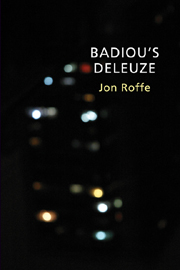5 - Truth and time
Summary
Badiou's discussion of the themes of time and truth constitutes the most peculiar moment in his study of Deleuze. This discussion, found in chapter five of The Clamor of Being, is structured around a surprising string of equations such that, by the end of the chapter, the following terms have all been posited as synonymous: time, truth, the virtual, atemporal eternity, Relation and the One. Here, my concern will be less to argue against this bold string of equations, but rather to deal with the central link: the equation of time and truth. We must then discover, at least schematically, what role time and truth play in Deleuze's philosophy, and the manner in which they are articulated.
It is easy to see why Badiou takes this theme to be such an important aspect of Deleuze's philosophy: his own thought gives a decisive important role to truth as the created foundation of change in situations. Likewise, when Badiou writes – in order to distinguish himself from Deleuze – that “Truths are actual multiplicities with a much higher ‘Dionysian’ value than that accruing to any sort of phenomenological salvaging of time” (DCB 60/91), the force of his point is once more derived from his own account of the novelty inherent in truth.
- Type
- Chapter
- Information
- Badiou's Deleuze , pp. 80 - 103Publisher: Acumen PublishingPrint publication year: 2011



